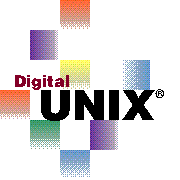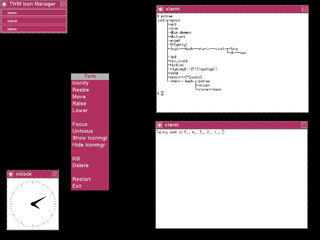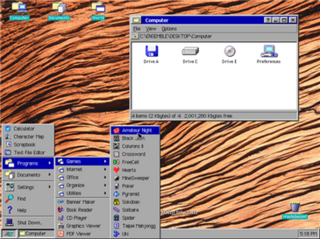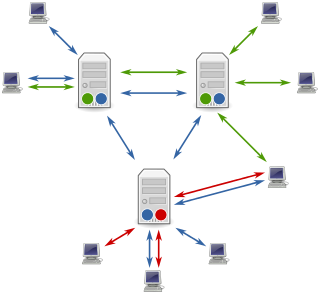Related Research Articles

A bulletin board system or BBS is a computer server running software that allows users to connect to the system using a terminal program. Once logged in, the user can perform functions such as uploading and downloading software and data, reading news and bulletins, and exchanging messages with other users through public message boards and sometimes via direct chatting. In the early 1980s, message networks such as FidoNet were developed to provide services such as NetMail, which is similar to internet-based email.
FidoNet is a worldwide computer network that is used for communication between bulletin board systems (BBSes). It uses a store-and-forward system to exchange private (email) and public (forum) messages between the BBSes in the network, as well as other files and protocols in some cases.

Tru64 UNIX is a discontinued 64-bit UNIX operating system for the Alpha instruction set architecture (ISA), currently owned by Hewlett-Packard (HP). Previously, Tru64 UNIX was a product of Compaq, and before that, Digital Equipment Corporation (DEC), where it was known as Digital UNIX.

PKZIP is a file archiving computer program, notable for introducing the popular ZIP file format. PKZIP was first introduced for MS-DOS on the IBM-PC compatible platform in 1989. Since then versions have been released for a number of other architectures and operating systems. PKZIP was originally written by Phil Katz and marketed by his company PKWARE, Inc, with both of them bearing his initials: 'PK'.
In the Unix operating system, shar is an archive format created with the Unix shar utility. A shar file is a type of self-extracting archive, because it is a valid shell script, and executing it will recreate the files. To extract the files, only the standard Unix Bourne shell sh is usually required.

The GNU Project is a free software, mass collaboration project that Richard Stallman announced on September 27, 1983. Its goal is to give computer users freedom and control in their use of their computers and computing devices by collaboratively developing and publishing software that gives everyone the rights to freely run the software, copy and distribute it, study it, and modify it. GNU software grants these rights in its license.

twm is a window manager for the X Window System. Started in 1987 by Tom LaStrange, it has been the standard window manager for the X Window System since version X11R4. The name originally stood for Tom's Window Manager, but the software was renamed Tab Window Manager by the X Consortium when they adopted it in 1989. twm is a stacking window manager that provides title bars, shaped windows and icon management. It is highly configurable and extensible.

MindVox was an early Internet service provider in New York City. The service was referred to as "the Hells Angels of Cyberspace" — it was founded in 1991 by Bruce Fancher and Patrick Kroupa, two former members of the Legion of Doom hacker group. The system was partially online by March 1992, and open to the public in November of that year.
Legend of the Red Dragon (LORD) is a text-based online role-playing video game, released in 1989 by Robinson Technologies. LORD is one of the best known door games. The player's goal is to improve their skills in order to defeat the Red Dragon which has been attacking the village. The software is compatible with DOS, Microsoft Windows, and OS/2. The game was sold to and is currently owned by Metropolis Gameport.

GEOS is a computer operating environment, graphical user interface (GUI), and suite of application software. Originally released as PC/GEOS, it runs on DOS-based, IBM PC compatible computers. Versions for some handheld platforms were also released and licensed to some companies.

PCBoard (PCB) was a bulletin board system (BBS) application first introduced for DOS in 1983 by Clark Development Company. Clark Development was founded by Fred Clark. PCBoard was one of the first commercial BBS packages for DOS systems, and was considered one of the "high end" packages during the rapid expansion of BBS systems in the early 1990s. Like many BBS companies, the rise of the Internet starting around 1994 led to serious downturns in fortunes, and Clark Development went bankrupt in 1997. Most PCB sales were of two-line licenses; additional line licenses were also available.
Mystic BBS is a bulletin board system software program that began in 1995 and was first released to the public in December 1997 for MS-DOS. It has been ported to Microsoft Windows, OS/2, OS X, and Linux. Mystic was designed to be a spiritual successor to the Renegade (BBS) and Telegard bulletin board systems.

PRIMOS is a discontinued operating system developed during the 1970s by Prime Computer for its minicomputer systems. It rapidly gained popularity and by the mid-1980s was a serious contender as a mainline minicomputer operating system.

Elvis is an enhanced clone of the vi text editor, first released in January 1990. It introduced several new features, including syntax highlighting and built-in support for viewing nroff and HTML documents. Elvis is written by Steve Kirkendall and is distributed under the Clarified Artistic License (ClArtistic) which is used by Perl and is a GPL-compatible free software license.
BNU is a high-performance communications device driver designed to provide enhanced support for serial port communications. The BNU serial port driver was specifically targeted for use with early DOS-based BBS software. The reason for BNU and other similar enhanced serial port drivers was to provide better support for serial communications software than what was offered by the machine's BIOS and/or DOS being used on the machine. Having serial port support as provided by BNU and other similar drivers allowed the communications software programmers to spend more time on the actual applications instead of the depths and details of how to talk to the serial ports and the modems connected to them. Sending communications data across a modem link was a lot more involved than sending data to a serial printer which was basically all that was originally capable of being done with the existing serial port software support.

RemoteAccess is a DOS Bulletin Board System (BBS) software package written by Andrew Milner and published by his company Wantree Development in Australia. RemoteAccess was written in Turbo Pascal with some Assembly Language routines. RemoteAccess began in 1989 as a clone of QuickBBS by Adam Hudson. It was released under the shareware concept in 1990 and became popular in North America, Europe, UK, South Africa, and the South Pacific. Initially the main advantage over QuickBBS was its ability to run multiple nodes under Microsoft Windows, Quarterdeck's DESQview and OS/2. RA could also operate over a network or even a combination of network and multitasking operating systems to provide multiple "nodes per station" capabilities.
Festering Hate and CyberAIDS are the names of the first two Apple ProDOS viruses. CyberAIDS appears to have been a series of viruses with minor changes in the code, culminating in the final version called Festering Hate, which appeared in 1988. When the virus went off, the title page credited "Rancid Grapefruit" and "Cereal Killer" of the "Kool/Rad Alliance!"
GT Power is a bulletin board system (BBS) and dial-up telecommunications/terminal application for MS-DOS. It was first introduced in the 1980s by P & M Software, founded by Paul Meiners. GT Power can be used both to host a BBS as well as to connect to other BBS systems via its full-featured dial-up "terminal mode." GT Power was a shareware package that required a registration fee in order to access its proprietary network mail transport/handling software and, by default, the GT Power Network. The software is distributed in two "flavors"; a terminal-only version, nicknamed GTO, and the full-featured host and terminal version.

Usenet is a worldwide distributed discussion system available on computers. It was developed from the general-purpose Unix-to-Unix Copy (UUCP) dial-up network architecture. Tom Truscott and Jim Ellis conceived the idea in 1979, and it was established in 1980. Users read and post messages to one or more topic categories, known as newsgroups. Usenet resembles a bulletin board system (BBS) in many respects and is the precursor to Internet forums that have become widely used. Discussions are threaded, as with web forums and BBSs, though posts are stored on the server sequentially.
References
- ↑ "The first public release was 1.58, in December 1989." - Waffle Modification Log (in HISTORY.DOC) from version 1.65.
- ↑ "Waffle Frequently Asked Questions (FAQ)". www.faqs.org. Retrieved 2020-01-24.